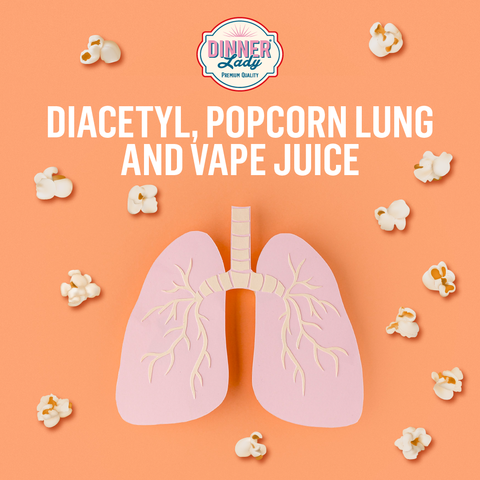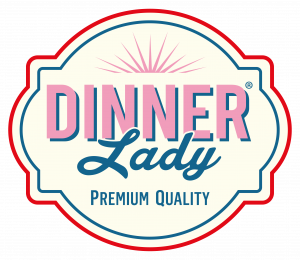For around two decades, concerns have been reported surrounding exposure to flavouring additive diacetyl.
Diacetyl was initially brought to attention when lawsuits were filed by popcorn-plant workers that had been diagnosed with “popcorn lung” caused by the high levels they were exposed to when manufacturing the buttery sweet treat.
Then attention turned to vape and e-liquids in 2015 when researchers at Harvard found 75% of e-liquids they tested contained dangerously high levels of diacetyl. Vapers buying from Dinner Lady can rest assured, however, that our e-liquids are made from high-quality ingredients and meet vape regulatory standards – which include a ban on diacetyl.
So, what is diacetyl, what is it used for, is it in e-juice and why exactly is it banned?
SUMMARY
About diacetyl
Is diacetyl banned?
Diacetyl side effects
Diacetyl in e-liquids
Dinner Lady e-liquids
FAQ
What is diacetyl used for?
Diacetyl is an organic compound used in foods and additives to add flavour. Diacetyl creates a sweet, buttery flavour and is often found in sweet, rich foods including dairy products, alcohols and popcorn.
Diacetyl is a naturally-occurring flavouring that is found in foods such as dairy, coffee, honey and fruit. Most diacetyl, however, is artificially manufactured and is added to processed foods to add flavour to otherwise bland and tasteless foods such as margarine, popcorn and crackers.
As a flavour compound, manufacturers are not legally obliged to list it as an ingredient in food items. Diacetyl often comes under “natural flavourings” or “artificial flavourings” on an ingredients list.
Is diacetyl banned?
According to Public Health England, diacetyl is banned as an ingredient in e-cigarettes containing nicotine, meaning that UK-based vapers can rest assured that their favourite e-liquids are safe for consumption.
DIACETYL SIDE EFFECTS: POPCORN LUNG AND ALZHEIMER’S
Overexposure to diacetyl by inhalation has been found to cause serious respiratory complications and lung diseases including bronchitis obliterans.
The common nickname of “popcorn lung” came about when it emerged that workers in popcorn factories were developing bronchitis obliterans, linked to the exposure to diacetyl they experienced in work. Several lawsuits have followed, including a notable case that saw employees awarded $20million after one employee faced a double lung transplant following complications caused by inhaling diacetyl at his workplace.
Research has also found links between diacetyl and other health concerns including Alzheimer's, lung disease and other respiratory conditions. Numerous diacetyl lawsuits have been filed – and won – by those who have suffered serious complications from being exposed to diacetyl.
A KERNEL OF TRUTH: DIACETYL IN E-LIQUIDS
During a 2015 study, Harvard University found that over 75% of tested e-cigarettes and e-liquids contained diacetyl. This led to a popcorn panic with many vapers believing that all e-liquids contain high levels of diacetyl, and that vaping is the primary cause of popcorn lung.
In reality, e-liquids and vaping have not been identified as a cause of any case of popcorn lung. This is because e-liquids and e-cigarettes produced in the UK and EU are required by law to conform to the TRPR and Tobacco Products Directive (TPD), which bans the use of diacetyl as an ingredient in any e-liquid or e-cigarette.
In 2016, TPD regulations – adopted in the UK under the TRPR, stipulated that all e-liquids must be diacetyl-free to comply with the excellent quality and health standards that it upholds. To adhere to TPD legislation, e-liquids must not contain traces of diacetyl.
Unlike cigarettes – which may contain up to 433ppm of naturally-occurring diacetyl – e-liquids contain a miniscule amount of diacetyl, if any at all. Most e-liquids are diacetyl-free due to UK governing bodies having banned diacetyl from being used as an ingredient in e-cigarettes and e-liquids. Though a great flavour compound known for its buttery taste, TPD-compliant e-liquids are not legally permitted to contain diacetyl.
Due to the TRPR/TPD regulation, e-liquids and e-cigs without diacetyl are easy to come by in the UK. Simply pick any e-cigarette and e-liquid found on the shelves of a reputed vape company or e-juice brand.
What is diacetyl?
Diacetyl is what gives foods and beverages a buttery flavour. It occurs naturally in some products and is artificially added to others.
Is diacetyl bad for you?
When consuming small doses, diacetyl is not thought to be harmful to the body. The problem with diacetyl lies with overexposure and inhalation.
How much diacetyl is dangerous?
Diacetyl is considered safe to consume in small amounts.
Does diacetyl cause popcorn lung?
Workers exposed to significant amounts of diacetyl in popcorn factories have been known to develop serious cases of bronchitis obliterans – also known as popcorn lung – and other illnesses.
For further information, it is always best to consult a medical professional.
Is diacetyl in all vape juice?
Diacetyl is banned in e-liquids made in the UK and EU under TRPR and TPD regulations. No Dinner Lady e-liquids or e-cigarettes contain diacetyl.
Is diacetyl banned in the UK?
Diacetyl is banned in e-liquids made in the UK and EU under TRPR and TPD regulations. However, diacetyl is still a common ingredient in many common foods and drinks.
Is diacetyl listed as an ingredient?
Diacetyl is a flavouring ingredient and so may not be listed specifically on any product packaging. When present, diacetyl will appear under “flavourings” on an ingredients list.
Does Dinner Lady vape juice contain diacetyl?
All Dinner Lady vape juice and e-liquids conform to the UK’s TRPR and EU’s TPD regulations. As such, they do not contain any traces of diacetyl.








